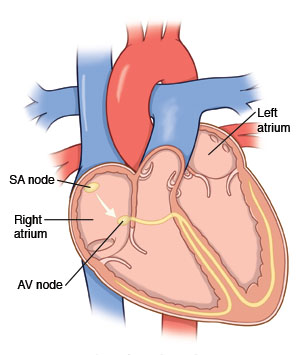About Arrhythmias

Your heart beats about 60 to 100 times a minute while at rest. Each beat sends blood through the heart and out to your body.
An arrhythmia is a change from the normal speed or pattern of your pulse. Your heart may beat too fast, too slow, or unsteadily.
Symptoms of arrhythmias
Arrhythmias affect different people in different ways. And arrhythmias can cause different symptoms. Sometimes you may not have symptoms, but you just notice a change in your pulse. Symptoms can include:
-
Palpitations. This is the sense that your heart is fluttering or beating fast or hard or irregularly.
-
Shortness of breath.
-
Chest pain or pressure.
-
Neck fullness.
-
Feeling lightheaded or dizzy, or fainting.
-
Feeling tired, fatigued, or weak.
-
Cardiac arrest, and death, in serious arrhythmias.
Causes of arrhythmias
Arrhythmias can be caused by heart disease, such as:
Other causes include:
-
Older age (most common).
-
Some medicines, such as asthma inhalers and decongestants.
-
Some herbal supplements.
-
Drugs and medicines that stimulate the heart. These include cocaine, amphetamines, diet pills, some decongestant cold medicines, caffeine, and nicotine.
-
Heavy use of alcohol.
-
Anxiety and panic disorder.
-
Thyroid disease.
-
Anemia.
-
Diabetes.
-
Sleep apnea.
-
Obesity.
-
Heart disease since birth (congenital).
-
Heart diseases passed down through families.
-
Electrolyte imbalance. Electrolytes are substances that help regulate normal heartbeat. High or low levels of certain electrolytes such as potassium or magnesium may lead to arrhythmia.
Some arrhythmias can be prevented. The cause and type of arrhythmia determines the best treatment. Your health care provider may want to track your heart rate over 24 hours or longer. This can help find the cause of your arrhythmia and the best treatment. Your provider may use a Holter monitor. This is a portable recording device attached to your chest. Or you may get an event monitor, which records heart rhythms. You can carry this with you as you go about your daily routine. Some of these monitors can record your heart rhythm for up to 4 weeks. You may also have an implantable loop recorder. This can record your heart rhythm for up to 5 years. This tiny device goes under the skin over your heart.
Home care
To help you care for yourself at home:
-
Stay away from heart stimulants. These include cocaine, amphetamine, diet pills, some decongestant cold medicines, caffeine, and nicotine.
-
Do not smoke. If you need help quitting, talk to your health care provider.
-
Tell your provider about any medicines you take. These may be affecting your heart rhythm.
Follow-up care
Follow up with your provider. If you're getting a Holter monitor, contact the doctor as soon as you can to pick up the device. You may have other tests at that time.
Call 911
Calling 911 is the fastest and safest way to get to the emergency room. The paramedics can start treatment on the way to the hospital, if needed.
Don't wait until your symptoms are severe to call 911.
Call 911 if:
-
You have chest pain that spreads to your shoulder, arm, neck, or back.
-
You are short of breath.
-
You feel lightheaded, faint, or dizzy.
-
You have unexplained fainting.
-
Your heartbeat is faster or slower than normal.
-
Your heartbeat is very irregular.
-
You have chest pain with weakness, dizziness, heavy sweating, nausea, or vomiting.
-
You feel extremely drowsy or confused.
-
You have weakness in an arm or leg or one side of your face.
-
You have trouble with speech or vision.
When to get medical advice
-
Get help for chest pain or if something feels "off," even if your symptoms are mild.
-
Don't drive yourself. Have someone else drive. If no one can drive you, call 911.
-
If your provider gave you medicines to take when you have symptoms, take them, but don't delay getting help while trying to find them.
Online Medical Reviewer:
Stacey Wojcik MBA BSN RN
Online Medical Reviewer:
Steven Kang MD
Date Last Reviewed:
11/1/2024
© 2000-2025 The StayWell Company, LLC. All rights reserved. This information is not intended as a substitute for professional medical care. Always follow your healthcare professional's instructions.